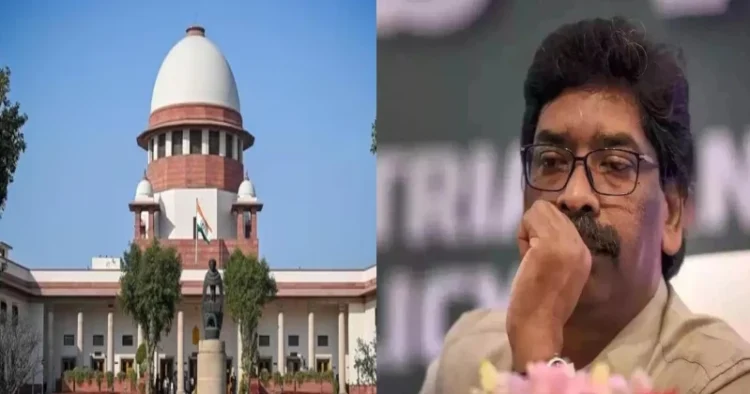In a significant legal development, the Supreme Court has dismissed the petition filed by former Jharkhand Chief Minister Hemant Soren challenging his arrest by the Enforcement Directorate (ED) on money laundering charges. The court, while rejecting Soren’s plea, directed him to pursue his case in the High Court, asserting, “We are not interfering.”
Hemant Soren was apprehended late on Wednesday night, and subsequently, he was sent to judicial custody for one day. The central agency had sought a 10-day custody, and a final decision on this request is anticipated today.
In his petition before the Supreme Court, Hemant Soren contended that the Enforcement Directorate had “abused its power and acted in a malafide manner to destabilise a democratically-elected state government.” He asserted that his arrest was “illegal and without jurisdiction,” claiming that the ED was acting under the directives of the central government to disrupt a democratically-elected government led by him.
The arrest of Hemant Soren unfolded amid high drama throughout the week, starting with what was termed “the case of the missing Chief Minister.”
The Enforcement Directorate has accused Hemant Soren of involvement in a Rs 600-crore land scam and money laundering related to its proceeds. The former Chief Minister vehemently denies these charges and has characterized the actions against him as politically motivated.
Meanwhile, in the political landscape of Jharkhand, Champai Soren, a veteran leader of the Jharkhand Mukti Morcha, is set to take the oath as the next Chief Minister of the state today. The political transition comes at a time of heightened legal scrutiny on the former Chief Minister Hemant Soren.
As the legal battle ensues, the Supreme Court’s decision to dismiss Hemant Soren’s plea puts the onus on him to seek legal recourse through the High Court. The legal proceedings will likely shape the course of events in Jharkhand, affecting both the political and legal spheres in the state.
The case has garnered attention due to its potential implications on the political landscape of Jharkhand and the broader discourse on the alleged misuse of power and political motivations in legal proceedings. The Enforcement Directorate’s accusations against Hemant Soren have sparked a contentious legal and political battle, with the former Chief Minister maintaining his innocence amid the unfolding developments.
As Jharkhand awaits the legal proceedings and political changes, the Supreme Court’s decision marks a pivotal moment in the unfolding narrative surrounding Hemant Soren’s arrest and the ensuing legal challenges.




















Comments